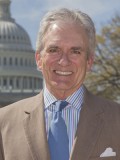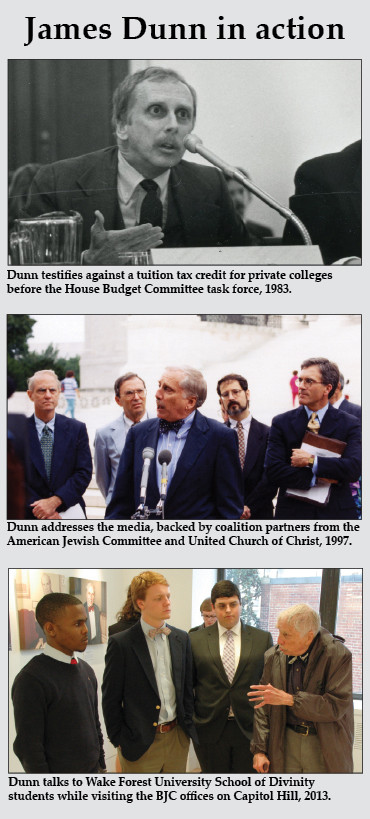 By Executive Director J. Brent Walker
By Executive Director J. Brent Walker
I had the honor of presenting a short eulogy for my mentor and friend James Dunn at his memorial service at Knollwood Baptist Church in Winston-Salem, N.C. The service was streamed live online and later posted on the BJC website and Facebook page. Several days later, I recorded a podcast interview with the BJC’s communications associate, Jordan Edwards, sharing additional recollections about my relationship and work with James. I decided to devote my column this month to a somewhat edited transcript of that podcast interview. I hope you enjoy these personal reflections of someone who meant so much to me and so many of you.
JORDAN EDWARDS: We are recording this a few days after Dr. James Dunn’s memorial service. Brent, I know it was a somber occasion, but what did you enjoy about the service?
BRENT WALKER: Just remembering the good things about James’ life, talking about them with friends. There were people who I hadn’t seen in many years, some who go way back. And we just had a good time remembering and celebrating James’ life, even as we regretted his passing.
JE: Before we get into Dr. Dunn’s legacy as executive director of the BJC, how would you describe James Dunn as a person?
BW: Well, he was a wonderful person, a good and dear friend. What comes to mind when I think of James is that he really did care about people. He loved people. He reached out and was involved in their lives and had an incredible extended family of good friends. He and Marilyn didn’t have any children, but he affected so many young people’s lives, his many adopted “young ’uns,” as he would call them. He was a caring person, a loving person. As is the case with many great men and women, he was something of a contradiction in many ways. He could be tough and tender at the same time. He could be prophetic and pastoral. He could be mean and charitable. He believed deeply in freedom, but also responsibility at the same time. He spoke with that down-home Texas twang, sort of a high-pitched tone when he got excited. But he could turn around and pray in King James English. Wonderful guy, and we’re gonna miss him.
JE: Though his list of accomplishments is long, Dr. Dunn might best be remembered for his concept of “soul freedom.” Brent, why was soul freedom so important to Dr. Dunn?
BW: Dr. Dunn regarded soul freedom as the theological taproot of everything else. It goes to the very essence of our relationship with God — that God-infused liberty of conscience we all enjoy, not because we’re Baptist or Christian, but because we’re human beings created in God’s image. And for that relationship to be true and genuine, it has to be based on love and voluntarily entered into. It all starts with soul freedom, and from that everything else goes out. Religious liberty is the ethical imperative that follows from the theological principle of soul freedom. It means that the soul freedom that I enjoy should be extended to everyone else in the country and in the world. Everybody!
JE: What was it like at the BJC in the early 1990s when you, Dr. Dunn and [former BJC General Counsel] Buzz Thomas worked in coalition to create the Religious Freedom Restoration Act [RFRA]?
BW: It was an interesting time. All three of us were involved, although Buzz pretty much led the effort from the BJC’s point of view and led the coalition that lobbied for the passage of RFRA. It was a heady time. We were all reeling from the Supreme Court’s unfortunate decision that essentially gutted the Free Exercise Clause in the First Amendment in the Native American peyote case. We were, of course, pursuing a legislative fix to provide additional protection for the exercise of religion statutorily, if not constitutionally. We knew we were doing something important that, if successful, would have ramifications throughout our country in protecting religious liberty. It was a fun time.
 JE: I feel like that was when Dr. Dunn was in his element, making phone calls and connections and doing what Dr. Dunn did best, you know?
JE: I feel like that was when Dr. Dunn was in his element, making phone calls and connections and doing what Dr. Dunn did best, you know?
BW: Right, no absolutely. He was involved. And, golly, I’ll never forget the day he said, “What we need is a little legislative Viagra!” Actually, that was several years later when we were working on a follow-on piece of legislation after part of RFRA was struck down as unconstitutional. But, yeah, that was James all right, “legislative Viagra.” He hit the nail on the head.
JE: Let’s talk about the Equal Access Act. Why was this piece of legislation so important and what part did Dr. Dunn and the BJC play in its passing?
BW: We were very much involved. This was several years before I came to the BJC. Essentially, it ensured that religious clubs in public secondary schools could meet on the same footing as other non-curriculum related groups. It was a very important piece of legislation that James was very much involved with and, as with the case with RFRA, the Equal Access Act had bipartisan support. He worked with both the Republicans, like Mark Hatfield, and Democrats to form a coalition to pass this very important piece of legislation to ensure the rights of students to meet on campus before and after school. It was indicative of James’ desire not just to criticize bad ideas, but to pursue good ideas. It really got started with James’ and others’ opposition to President Ronald Reagan’s call for a constitutional amendment on school prayer. He opposed it, but said let’s do something positive. He believed students should be able to worship voluntarily before and after school as long as the government — as long as the school was not involved in it other than to monitor the meeting. As long as it is student-initiated and student-led, it is perfectly permissible. He not only criticized a bad idea, but he turned around and pursued a good idea that would reach positive results.
JE: Brent, what’s your favorite James Dunn quote?
BW: Jordan, it’s hard to pick one, because there are so many good ones. Most people are familiar with his quote about theocracy. He would often say in opposition to a theocracy, “The problem I have with theocrats is they all want to be Theo.” And, every time he would say that in a speech he would get a big laugh. Actually, one time when I was still in seminary after I had planned to come to the BJC, I thought, “I’m gonna go to the library and check out all the James Dunn tapes I can find.” So, I got a whole bunch of them, and I’m listening to James preach, teach and lecture. I heard that “Theo” line. I don’t know where it was or where he was speaking, but there was, of course, uproarious laughter. As the laughter died down you could just hear him say — it must have been a panel, because it sounded like he was whispering, “You know, if you ever get one of those, never give it up, just keep using it, keep using it.” So, he kept using it. And it was not just that it engendered laughter, it was a good, poignant point that he was trying to make: Whose religion are you going to establish when you talk about privileging Christianity and establishing something akin to a theocracy? It was typical James Dunn.
There’s another one that I have often enjoyed, and it has to do with the combination of freedom and responsibility. It was not an either/or thing for James. It was a both/and. The quote is, “Freedom is not absolute, no one is ‘free as a bird.’ Only a bird is free as a bird.” Continuing, he said, “Freedom and responsibility are like two sides of a coin, inseparable. No matter how thin it is sliced, the coin of responsible freedom still has two sides.” (Click here for a list of James Dunn quotes)
JE: How will you remember James as a person? What will stick with you?
BW: Well, his humor, his incredible intelligence, the interest he took in the lives of so many people. As I said before, the fact that he cared about and loved people was always front and center. Visually, I think of his bow tie, I think of him talking with his bony fingers as much as with his voice. His smallish body, but not withstanding that he had such a huge presence in the room. Buzz Thomas has said, “James is a lion trapped in the body of a housecat.” And I think that’s apt. I’ll give Buzz credit for that. That visual image will always be impressed on my mind. And just the fact that he was just such a giving, caring, intelligent, funny guy.
JE: He taught for years and years at Wake Forest University School of Divinity after he left the BJC. So he never gave up on his principles. He never stopped teaching and continuing what he believed in to the next generation.
BW: Not only did he not recede from it, he intensified it. When he left the BJC, he got involved with transferring that passion, that intelligence, that knowledge, those principles to another generation of Baptists. As good a preacher as he was, as good a lobbyist, as good a public policy advocate, he was a consummate teacher and could get the message through to young people. Again, not just brain to brain but heart to heart, and they knew he cared about them as persons as well as what they were supposed to learn in class.
For the complete interview — as well as additional BJC podcasts — visit BJConline.org/podcasts or subscribe to our iTunes channel.
From the July/August 2015 Report from the Capital. Click here to read the next story.
Former staff members Larry Chesser and Kenny Byrd also wrote tributes to James Dunn for this edition of Report from the Capital.





